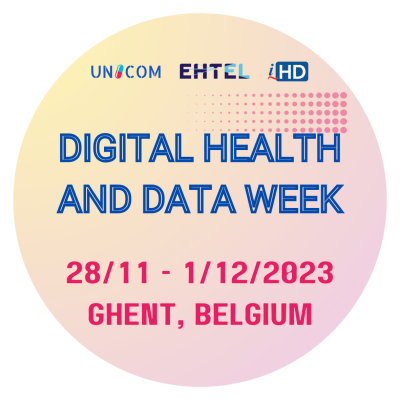Robert Van Der Stichele (I~HD) moderated the session “Medicines data integration for clinical use: New implementation patterns“.
Today, e-prescribing systems are spreading steadily across Europe. While they are important, these systems are only a starting point for delivering real clinical value. Collaborative and integrated management of the patient medication record requires even more ambitious developments: these are now considered an implementation priority by an increasing number of countries. During this informative session supported by UNICOM, we learned what new implementation patterns have meant concretely and practically for some new developments. Dirk Broeckx, Head Pharmacist from the Belgian IFB, explained explored ways to use what exists, in a cleverer way, together with the ‘VMP-Medication-Overview’ and current artificial intelligence (AI) that is underway on posology (patient instructions).
Vincent Keunen, Founder and CEO of Andaman7, decided to develop an electronic personal health record (PHR) in response to several unmet crucial needs that were unveiled after he was diagnosed with cancer. Andaman7 is a very powerful tool that improves patient care and safety, and connects patients directly with clinical research. The advanced drug management module developed by Andaman7 has the objective to make this connection possible now, even in the absence of a mature public digital health infrastructure. Andaman7’s bottom-up approach does not require data storage in the cloud since all transactions take place in the secure environment of the patient smartphone. Today, the application is used in several countries.
Robert Van Der Stichele concluded that the work undertaken by the UNICOM project, on the Implementation of Medicinal Products (IDMP) ,should help to better connect Medicinal Products data with trusted data sources, and hence support innovation.
Aside from this very session, two other sessions were closely connected to UNICOM as they intended to present examples of creation of intergrated eco-systems dealing with innovative approached to interoperability and infrastructure for data sharing.
Slides of the presentations are available here
This second session explored two initiatives. Both are ambitious in wanting to make an interoperability breakthrough. They explore new processes to create social value and support innovation. The two presentations show just how much data interoperability and security are facilitated when one can rely on official databases and syst
In the last session the focus was on three initiatives. Each had different levels of maturity and starting points – both public and private – but all are very much rooted in reality. The presentations show how trust can be created among organisations involved in building data spaces to sustain continuity of care and innovative clinical practice. Support also comes from implementations like AI. To have an impact, large amounts of harmonised data are needed. Learn more and access slides.


